I woke up Saturday morning with the intent to work on a Hot Stove about baseball’s long-delayed opening day. But there were early emails from Irv Blond, Diana Brewer and Bill Lochman. All with the same sad message – Congressman John Lewis had died Friday night.
New plan. Must write about John Lewis.
Was there a baseball angle? Not really. When you Google John Lewis and baseball, one of the first results is this sentence from Wikipedia:
“In an interview with CNN during the 40th anniversary of the Freedom Rides, Lewis recounted the sheer amount of violence he and the 12 other original Freedom Riders endured in Birmingham, the Riders were beaten with baseball bats, chains, lead pipes and stones.”
Not what I was looking for, but it is certainly descriptive of the risks taken for many years by John Lewis as a leader in the Civil Rights Movement. I was able to run down a couple of John Lewis appearances in a baseball uniform.
Turner Field – Atlanta: In June of 2015, the 50th year after Selma, Lewis was honored before a Mets/Braves game in Atlanta. From 1987 until his death, Lewis represented Atlanta in Congress.
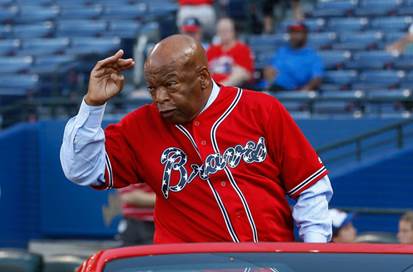
Lewis was remembered by a famous Atlanta baseball player in a tweet this past weekend:

Nationals Park – Washington D.C.: On April 15, 2018, the 71st anniversary of Jackie Robinson’s first major league game, Lewis threw out the first pitch at a Rockies/Nationals game.
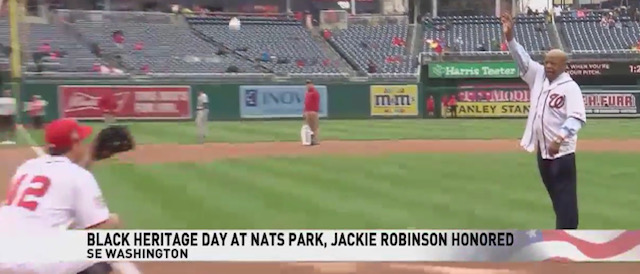
While Lewis was on the field, the scoreboard showed highlights of his life. The one in the photo below shows Lewis speaking at the 1963 March on Washington where Martin Luther King Jr. gave his “I Have a Dream” speech. At the time, Lewis was the 23-year-old head of the Student Nonviolent Coordinating Committee.
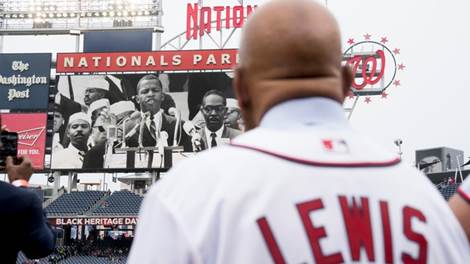
Jackie Robinson was also at the 1963 March on Washington (below and in this clip from Ken Burns’ documentary on Jackie).
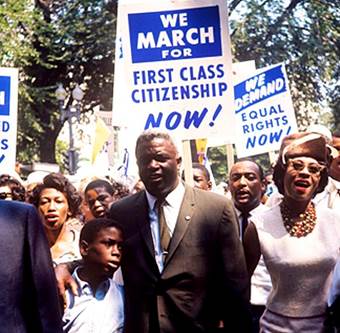
Nationals’ pitcher Sean Doolittle met with Lewis at Nationals Park that day in 2018 (below). Doolittle tweeted this past weekend that it was one of the highlights of his career. “Thank you for showing the world how to raise ‘good trouble’ and fight for civil rights. Rest in power John Lewis.” Doolittle was referring to a famous quote by Lewis: “Do not get lost in a sea of despair. Be hopeful, be optimistic. Our struggle is not the struggle of a day, a week, a month, or a year, it is the struggle of a lifetime. Never, ever be afraid to make some noise and get in good trouble, necessary trouble.”

My John Lewis Memorabilia: Missouri Congressman Ike Skelton died in 2013, and his estate held an online memorabilia auction the next year. When I browsed through the inventory, I spotted a letter to Skelton from John Lewis. The letter explained that Lewis was withdrawing from the race for Majority Whip, and he was asking Skelton to support Steny Hoyer. Lewis has long been a hero of mine, and so I signed up for the auction to see if I could buy the letter. After some spirited bidding against an unknown party, I finally got to the right number. Former Kansas City Congressman Alan Wheat, who is in our law firm’s DC office, mentioned the Skelton letter to Congressman Lewis who then graciously sent me this letter:
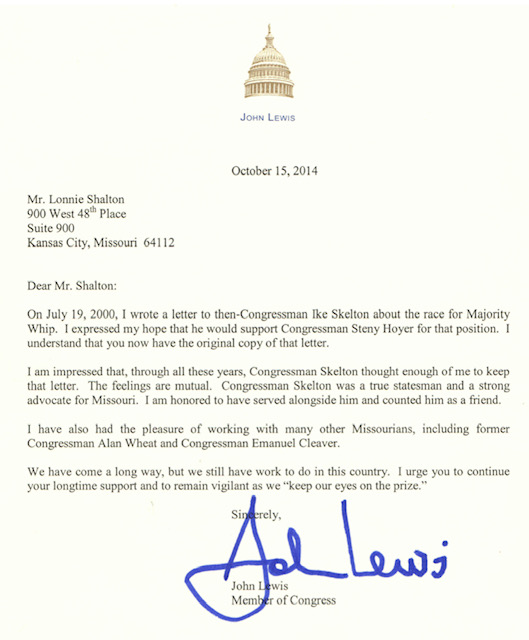
The quote at the end of the letter was a mantra often used by Lewis. The letter to Ike Skelton ended the same way.
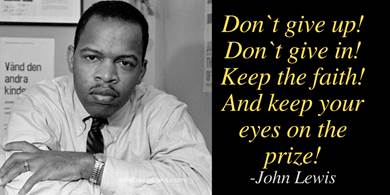
Walking With the Wind. Since 2002, I have posted a message for the Martin Luther King Jr. holiday. In late 2014, I had decided that the 2015 message would be on John Lewis, specifically the upcoming 50-year anniversary of “Bloody Sunday” in Selma. I checked Amazon for his 1998 autobiography, Walking With the Wind. The hardcover was out of print, but I wanted that edition and so ordered a used copy. There must have been many available because my Amazon account says it cost me $1.90 plus shipping. I checked Amazon while working on this post, and there has been a run on the book – only three copies available – two priced at $200 and a “collectible” for $5,000.
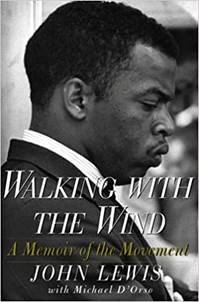
The description of the used book on Amazon indicated there was a name written in the front, but otherwise the book was unmarked. When I received the book, I saw this inscription in the front cover, “David Sholin July, 1998.” But there was more – inserted between two pages was a very nice pencil drawing of John Lewis based on the cover of the book.
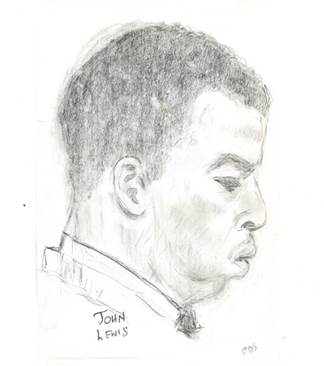
The drawing is initialed by “PDS,”, presumably (P) David Sholin. So of course I Googled the name. Paul David Sholin founded St. Mark’s Presbyterian Church in Tucson in 1948. He was an activist for civil rights, not always appreciated by some in his congregation. After he went to the March on Washington in 1963, 300 members quit the church in protest. He did not blink. He added women’s and immigrant’s rights to his causes over the years. He died at age 91 in 2012.
John Lewis and Paul David Sholin…brothers in the fight for social justice.
Martin Luther King Jr. Day – 2015: My MLK message for 2015 began as follows:
“It all started so quietly – in 1940:
Construction was completed on the Edmund Pettus Bridge over the Alabama River in Selma. The bridge was named in honor of a man who led Alabama’s Ku Klux Klan as its “Grand Dragon of the Realm” and served in the U.S. Senate from 1897 to 1907.
John Lewis was born in Troy, Alabama, about 90 miles from Selma.
Some 25 years later, John Lewis led a march across that bridge and added a new and tragic milestone to the Civil Rights Movement. Bloody Sunday.”
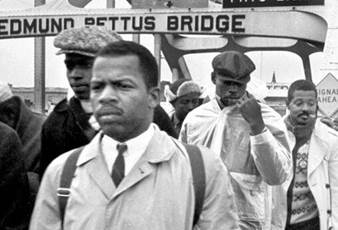
Sportswriter Joe Posnanski sent an apt tweet on Saturday: “In the spirit of good trouble, it is worth understanding what an evil man KKK grand dragon Edmund Pettus was and ask yourself how in today’s world there can be a bridge named for him. RIP John Lewis.”
There is an online petition to change the name to John Lewis Bridge, and as of this morning, nearly 500,000 have signed up (click here to add your name).
For my full 2015 post on John Lewis, please click here.
Truman Dinner – 2017: In April of 2017, Rita and I attended the Truman Institute’s annual “Wild About Harry” dinner. We were joined by Paul and Polly Donnelly and Joe and Cheryl Downs. We asked to be seated together and found ourselves assigned to the table of presenting sponsors John and Marny Sherman. Yes, the John Sherman that two years later bought the Royals. There was one other seat at the table, and Congressman John Lewis soon joined us. We felt like we had won the lottery.
Lewis and Congressman James Clyburn were being honored that night by the Truman Institute. Below, Rita and I with the two honorees.
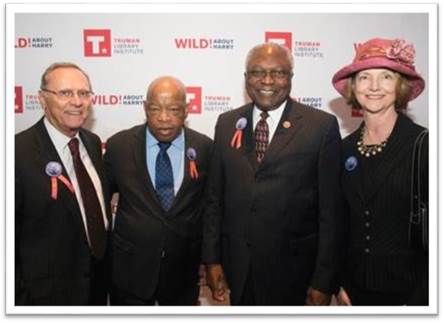
As part of the program, Congressmen Lewis and Clyburn were interviewed by Time Magazine writer David Von Drehle. It was a mesmerizing thirty minutes as we listened to these two civil rights giants discuss their time in the trenches of the Civil Rights Movement. Their optimism was inspirational. The message remains the same: love, forgiveness and nonviolence. But of course blended with good trouble to accomplish change. For more on the dinner and program, see Hot Stove #40.
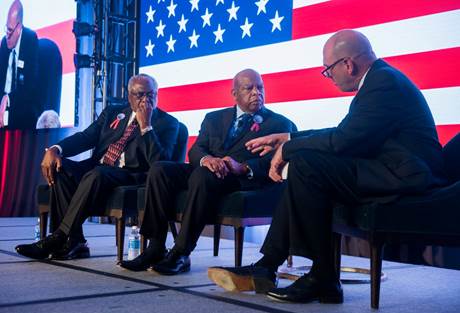
David Von Drehle is now with the Washington Post and wrote a wonderful article this past weekend about the loss of Lewis and fellow civil rights activist C.T. Vivian who also died on Friday. Click here for the full article, but here are some excerpts:
“Lewis proudly wore a starkly bald head that compelled respect like a carved idol. The bones of his skull were on frank display. Which ones took the brunt of that crate swung ferociously at the bus station in Montgomery? Where did the club land that knocked him unconscious as he marched in Selma across the Edmund Pettus Bridge?”
Von Drehle once asked Lewis how he steeled himself for such suffering. Lewis answered in his “simple, gentle – always authoritative” voice:
“You studied the way of peace. You studied the way of love. You studied the philosophy and the discipline of nonviolence…We had been taught never to hate or become bitter, never to lose the sense of hope. And in the process, you may get arrested a few times. You may be beaten and left bloody, left unconscious…But you keep going. You see something that is so necessary, so right. And I say to my colleagues sometimes, and to friends in my district, and to brothers and sisters in the movement, that you have to be hopeful, you have to be optimistic, be hopeful, keep going!”
John Lewis: Good Trouble (the movie): This is a new documentary released earlier this month and available on several streaming services. Rita and I watched it Saturday night and thought it was very good. Click here for the trailer
Lonnie’s Jukebox – Selections by Congressman John Lewis: In his book Walking With The Wind, John Lewis provided a playlist from his years as a Freedom Rider. The quotes below are from the book, and you can play any of the songs by clicking on the title.
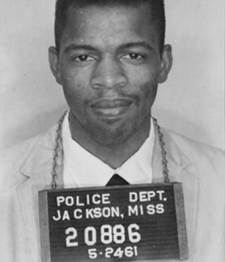
“Some of the deepest, most delicious moments of my life were getting out of jail in a place like Americus, or Hattiesburg or Selma – especially Selma – and finding my way to the nearest Freedom House, taking a good long shower…and going to…some little side-of-the-road juke joint…and walk over to that jukebox and stand there with a quarter in my hand and look over every song in that box because the choice had to be just right…and then I would finally drop that quarter in and punch up Marvin Gaye or Curtis Mayfield or Aretha…and I would let that music wash over me, just rush right through me. I don’t know if I’ve ever felt anything so sweet.”
“All those hours driving all those miles in all those cars went a little bit easier with the rhythms coming out of the dashboard radios…I remember returning from the Freedom Rides that summer of 1961 and lying in my bed listening to “Gee Whiz” by Carla Thomas. And to a new group called the Mar-Keys playing a blues-riff instrumental called “Last Night.” And to the Impressions, with a young lead singer named Curtis Mayfield, doing “Gypsy Woman.” And, of course, there was Solomon Burke, a former boy preacher just like me, now a bluesman singing deeply and strongly with his big hit that year, “Just Out of Reach.”
“By the summer of 1964, something called soul music arrived, and a record label out of Detroit called Motown was taking over the airwaves. Martha and the Vandellas’ “Dancing in the Street” “was all over the radio that summer, as were Mary Wells “My Guy” and a song called “Where Did Our Love Go” by a woman named Diana Ross. Within a year the soul sound would literally be a part of the movement, with politically overtoned songs like Sam Cooke’s “A Change Is Gonna Come” and the Impressions “People Get Ready” speaking directly to the work we were doing in the Deep South.”
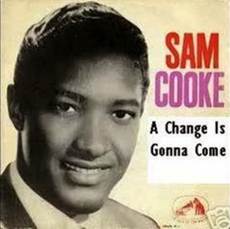
If Lewis had a favorite, it was likely Aretha Franklin. When she died in 2018, he said, in part:
“What made her talent so great was her capacity to live what she sang. Her music was deepened by her connection to the struggles and the triumphs of the African American experience growing up in her father’s church, the community of Detroit, and her awareness of the turmoil of the South. She had a lifelong, unwavering commitment to civil rights and was one of the strongest supporters of the movement. She was our sister and our friend. Whenever I would see her, from time to time, she would always inquire about the well-being of people she met and worked with during the sixties. When she sang, she embodied what we were fighting for, and her music strengthened us. It revived us. When we would be released from jail after a non-violent protest, we might go to a late night club and let the music of Aretha Franklin fill our hearts. She was like a muse whose songs whispered the strength to continue on. Her music gave us a greater sense of determination to never give up or give in, and to keep the faith.
Lewis saw Aretha perform many times over the years, including at the Inaugural of Barack Obama in 2009 (below). The song he often mentioned was written by Otis Redding, but made famous by Aretha who turned “Respect” into an anthem for civil rights and feminism.
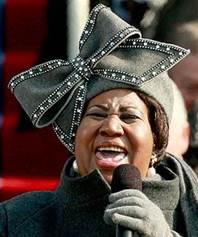
More recently, Lewis was known to be a fan of “Happy” by Pharrell Williams. You will be happy when you watch the Congressman dance in this video and again in this one.
Thank you for everything John Lewis. We promise to keep working for justice and to keep our eyes on the prize. And if necessary, get into some good trouble.